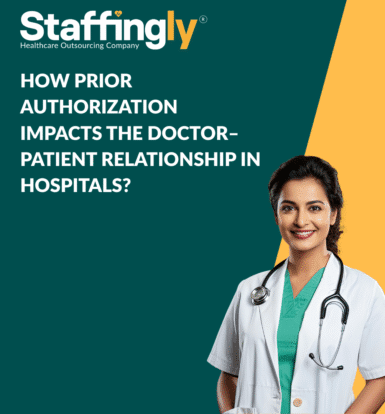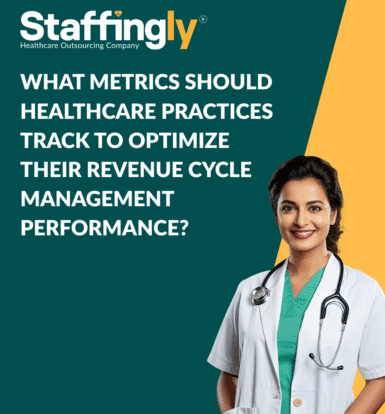On-Demand Outsourcing BPO Services for Healthcare Providers With 24/7 Coverage!
Save up to 70% on staffing costs!
Browse Specialty Staffing Services
Revenue Cycle Management: The Complete Guide to Maximizing Your Practice’s Financial Health
Revenue cycle management (RCM) is the financial backbone of every healthcare practice, yet it remains one of the most misunderstood and underoptimized aspects of practice operations. From the moment a patient schedules an appointment to the final payment posting, every step in this cycle directly impacts your practice’s financial health, cash flow, and long-term sustainability. The statistics tell a sobering story: the average medical practice loses 25-30% of potential revenue due to inefficient RCM processes, claim denials, and uncollected patient

Prior Authorization Is Costing Your Practice 16+ Hours Per Week: Here’s How to Fix It
Prior authorization has become one of the most burdensome administrative tasks in modern healthcare. What was originally designed as a cost-control measure has evolved into a time-consuming process that drains resources from medical practices of all sizes. Research consistently shows that the average medical practice spends 16 or more hours per week navigating the prior authorization maze, and for many practices, the real number is significantly higher. This isn’t just an inconvenience. Those lost hours translate directly into delayed patient

How To Cut Claim Denials In Half Without Adding More Staff?
Claim denials quietly erode the financial health of hospitals and physician practices, draining revenue, time, and staff energy. The Medical Group Management Association (MGMA) reports that healthcare organizations lose 3–5% of net revenue every year to preventable denials. For many providers, that’s the difference between financial stability and unnecessary strain. By combining smarter technology, refined workflows, and actionable data insights, hospitals and practices can significantly reduce denials often cutting them in half without increasing staff or overhead. Here’s how to

How Prior Authorization Impacts the Doctor–Patient Relationship in Hospitals?
In modern healthcare, few administrative processes evoke as much frustration as prior authorization (PA). Designed to ensure appropriate and cost-effective care, PA requires healthcare providers to obtain approval from insurance companies before delivering certain treatments, medications, or diagnostic tests. While its intent—to control unnecessary spending and safeguard patients from overtreatment sounds reasonable, the real-world execution often paints a different picture.For hospitals and clinicians, PA has become more than a bureaucratic hurdle; it is a barrier that can strain trust, delay

What Metrics Should Healthcare Practices Track to Optimize Their Revenue Cycle Management Performance?
Optimizing Revenue Cycle Management (RCM) goes beyond financial improvement — it’s a vital part of keeping a healthcare practice sustainable and efficient. When managed effectively, RCM ensures that providers are reimbursed accurately and promptly for the care they deliver, reducing payment delays, revenue loss, and unnecessary administrative effort. To strengthen overall performance, practices should focus on tracking specific metrics that reflect their financial stability, workflow effectiveness, and areas needing attention. The following key RCM indicators offer valuable insight into where

The Role of the Insurance Company in Prior Authorization Decisions
Prior authorization (PA) has become one of the most debated and time-intensive administrative processes in healthcare. Insurance companies play a central role in determining whether certain medical services, procedures, or medications are approved before treatment begins. Their decisions influence not only when patients can access care but also how providers are reimbursed for those services. This article examines how insurance companies manage prior authorization decisions, the steps involved in the process, and the broader effects these decisions have on both

Why Manual Claims Denial Management Is Costing Your Healthcare Revenue?
What Healthcare Professionals Are Saying? On Reddit and professional healthcare forums, one recurring frustration echoes across billing departments: “We’re losing thousands every month because denials just sit in the queue no one has time to chase them manually.” Another user added:“Our RCM team still uses spreadsheets for tracking denials. It’s 2025 this shouldn’t be happening.” Healthcare providers are under mounting financial strain squeezed between rising operational costs, payer scrutiny, and staffing shortages. While technology continues to evolve, many organizations still

How is Prior Authorization Affecting Your Ability to Deliver Care?
Prior authorization has become one of the most contentious administrative barriers in modern healthcare. What began as a utilization management tool to control costs and prevent unnecessary procedures has evolved into a complex bureaucratic process that fundamentally impacts how physicians deliver care. This article examines the multifaceted ways prior authorization affects healthcare delivery, drawing on recent data and firsthand experiences from medical professionals across specialties. The Growing Administrative Burden The sheer volume of prior authorization requests has reached unprecedented levels.
 Book a Demo to Build Your Team Today!
Book a Demo to Build Your Team Today!


 Read Case Studies
Read Case Studies 



 Virtual Medical Assistants
Virtual Medical Assistants



